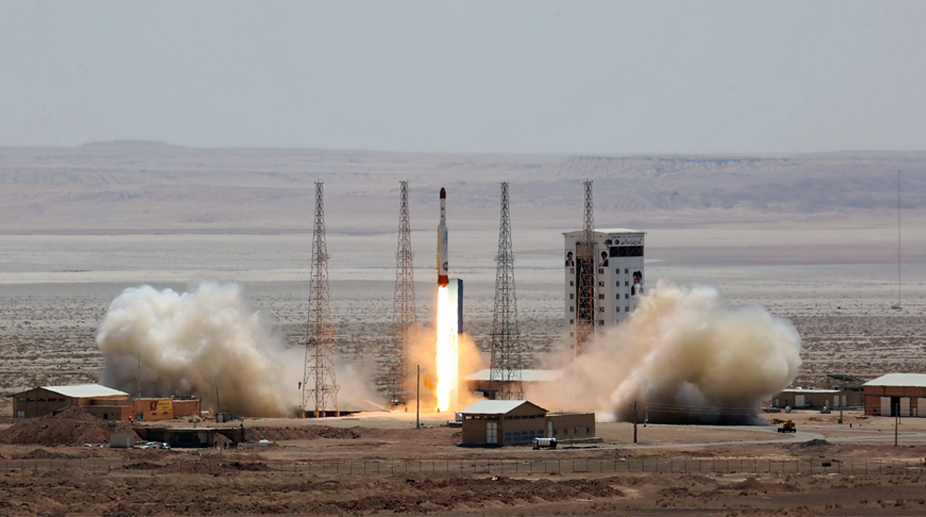Might is right, and so Iran is a pariah
Under the Vienna convention, embassies are treated as sovereign territories of the nation concerned, not of the host country.

Iran's Simorgh (Phoenix) satellite rocket (Photo: AFP)
The United States, France, Germany and Britain have condemned the launch of a space launch vehicle by Iran on July 27 and alleged that it is inconsistent with the United Nations Security Council (UNSC) resolution in this regard.
"With its latest launch of a Simorgh space launch vehicle on 27 July, Iran has again demonstrated activity inconsistent with UN Security Council Resolution (UNSCR) 2231. We condemn this action," the four countries said in a joint statement.
Three of them, the United States, France and Britain are members of the UN Security Council.
Advertisement
Germany is part of the G-4 group including India, Japan and Brazil who seek a permanent membership to the Security Council.
"Iran's program to develop ballistic missiles continues to be inconsistent with UNSCR 2231 and has a destabilising impact in the region.
We call on Iran not to conduct any further ballistic missile launches and related activities," the joint statement said.
"We are writing to the UN Secretary General with our concerns. The governments of France, Germany and the United Kingdom are discussing these issues bilaterally with Iran and are raising their concerns," they said.
The UN Security Council Resolution 2231, they said calls upon Iran to not undertake any activity related to ballistic missiles designed to be capable of delivering nuclear weapons, including launches using such technology like this launch.
Space launch vehicles use technologies that are closely related to those of ballistic missiles development, in particular to those of Intercontinental Ballistic Missiles.
"This step follows missile launches into Syria on 18 June and the test of a medium range ballistic missile on 4 July," the joint statement said.
US Ambassador to the United Nations, Nikki Haley, in a separate statement said the Trump Administration will not let Iran off the hook for behavior that threatens American interests.
"We will not simply trust Iran's word that they are in compliance with international obligations. We will continue to impose consequences until Iran stops its provocations and complies fully with Security Council resolutions," she said.
"The issue with Iran always comes back to mistrust.
Iran's widespread support for terrorists tells us we can't trust them.
Iran's breaking its obligation on missile testing tells us we can't trust them. Yesterday's launch proves that yet again," Haley said.
Earlier in the day, the Department of Treasury imposed sanctions on six Iran-based subordinates of Shahid Hemmat Industrial Group (SHIG), an entity which it said is central to Iran's ballistic missile program.
Such a move by the Department of Treasury comes a day after the Iran carried out launch of the Simorgh space launch vehicle.
The test, however, was not successful.
Treasury said space launch vehicles use technologies that are closely related to those of an intercontinental ballistic missile and this launch represents a threatening step by Iran.
As such the sanctions have been slammed against Shahid Karimi Industries, Shahid Rastegar Industries, Shahid Cheraghi Industries, Shahid Varamini Industries, Shahid Kalhor Industries, and Amir Al Mo'Menin Industries.
"The US Government will continue to aggressively counter Iran's ballistic missile-related activity, whether it be a provocative space launch, its development of threatening ballistic missile systems, or likely support to Yemeni Houthi missile attacks on Saudi Arabia such as occurred this past weekend," said Treasury Secretary Steven T Mnuchin.
"These sanctions target key entities involved in Iran's ballistic missile program, and underscore the United States' deep concerns with Iran's continued development and testing of ballistic missiles and other provocative behavior," Mnuchin said.
As a result of this action, all property and interests in property of those designated today subject to US jurisdiction are blocked, and US persons are generally prohibited from engaging in transactions with them.
In addition, foreign financial institutions that facilitate significant transactions for, or persons that provide material or certain other support to, the entities designated today risk exposure to sanctions that could sever their access to the US financial system or block their property and interests in property under the US jurisdiction.
Advertisement